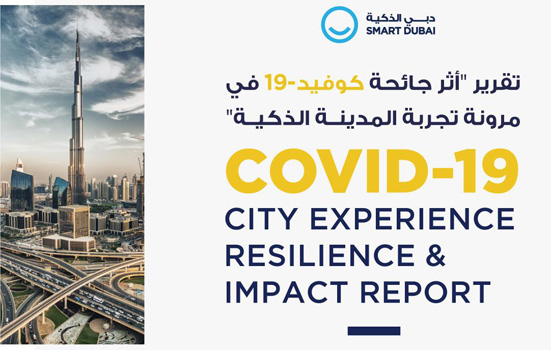Smart city services helped Dubai through Covid-19
- July 7, 2020
- Steve Rogerson

Dubai’s progress on smart city services helped it through the worst of the Covid-19 pandemic, according to a report from the UAE city’s Happiness Agenda, a Smart Dubai initiative.
The study found that Dubai was well equipped for remote working indefinitely and under any circumstances. It says adopting enabling technologies and developing a holistic vision are the pillars of a flexible smart city that thrives in times of crises.
The report offers a holistic view of the impact caused by the Covid-19 outbreak and outlines its effects on smart services. It aims to facilitate the formulation of a post-Covid-19 strategy.
The Happiness Agenda team at Smart Dubai compiled the report with smart city specialists focusing on city services and the work environment. They represented 20 government, semi-government and private sector entities. The study focused on three subjects – employees, corporate operations, and services provided to customers and employees alike.
The Dubai government demonstrated a high level of resilience in response to the Covid-19 pandemic, the report says, which has helped the emirate avoid any reduction in the quality of experiences and services offered to residents and visitors. Some services even saw improvements.
Aisha bint Butti bin Bishr, director general of Smart Dubai, said the Covid-19 outbreak led everyone to view challenges differently and to think of ways to transform them into opportunities, building a brighter future for the UAE.
“The pandemic had confined people to their homes at very short notice,” she said. “Educational training for students and work across the city, both at government and private sector entities, were conducted remotely and world governments found themselves facing unprecedented challenges. Dubai and the UAE were no exception. All entities in Dubai immediately sprang to action to preserve the government system that has allowed the UAE to earn its leading international status over the years.”
The report constitutes a collection of inputs from Smart Dubai and its partners in the public and private sectors.”
“As restrictions on movement in Dubai and the UAE are gradually eased, we sought to examine the impact this unprecedented crisis has had on the experiences of customers and employees in the emirate of Dubai,” she said. “Given that the impact of the crisis is still at a very dynamic stage, we evaluated its effects through accurate studies into the methods that cities employ to cope with global changes. We have released this report, complete with 34 takeaways and eight clear recommendations that we hope will support policy making in the post Covid-19 era to improve quality of life, and happiness of Dubai’s residents and visitors.”
The report said the disruption caused by Covid-19 on services in Dubai was limited; numerous organisations reported that their infrastructure and services were effective and adequately prepared for digital operations and providing services online, while others managed to digitise any remaining offline services quickly and provided them for immediate use online.
The safety of employees was a top priority for introducing such systems. Meanwhile, the positive outcomes of remote work included the added flexibility that employees found in their working conditions, as well as increased productivity and concentration. Furthermore, remote work has created opportunities in terms of office space designs, which means future office plans are bound to change, allowing for more flexibility and efficient use of space. Meanwhile, call centres were able to absorb immediately the large volume of calls from customers.
Overall, a new online work culture has emerged within institutions, one where call centres bridge the gap and tend to people who need someone to help them. Digital transformation was seen as a challenge, but urgent demand prompted organisations to accelerate innovation to provide all services over the internet. This rapid response was manifested through the speed at which officials collaborated and adapted to the changes as the pandemic accelerated in pace.
Participants in the report identified opportunities brought about by recent transformations, including more flexible work options for mothers and women in general, in addition to time and cost-saving processes. These opportunities have emerged as a direct result of the recent developments in infrastructure, and of the digital services provided by government, semi-government and private sector entities in Dubai.
The report offered a set of key recommendations that underlined Dubai’s preparedness to shift from a traditional work environment to working remotely, seamlessly and for an indefinite period of time. The report reveals that entities’ focus is now placed on productivity and output, while ensuring their employees lead a balanced life, physically and psychologically.
The report concluded that adopting empowering technologies was fundamental for a resilient smart city. It stressed the importance of working on sustaining and improving digital services and infrastructure.





